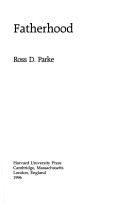The Developing Child (HUP)
1 total work
It has been said that fathers are a biological necessity but a social accident. Fifteen years ago, when Ross Parke first wrote about fathers for the "Developing Child" series, American culture seemed to adhere strongly to the stereotype of Dad the breadwinner, pacing outside the delivery room and peeking through the nursery window, and Mom the homemaker, warming bottles and changing diapers. In the intervening years the conventional image of the uninvolved father has given way to a new stereotype: the father who takes an active part in rearing his children.;The dramatic technological, economic and ideological changes in society over the past several decades have reconfigured the nuclear family and redefined the role of fathers. More women now work outside the home; fewer families can depend on an extended network of relatives for help with childcare; more divorced fathers assume or share custody of their children. Fathers have become partners in parenthood, wielding a more direct influence on their children's development.
But, Parke asks, is the new ideal of fathers - participating in childbirth and sharing in the care and feeding of their children - any more accurate than the earl
But, Parke asks, is the new ideal of fathers - participating in childbirth and sharing in the care and feeding of their children - any more accurate than the earl
